Music Educators Association of New Jersey
Serving teachers and students since 1927


MEA Presents...
Vanessa Cornett

Performance Anxiety Management for Musicians
Thursday, May 16, 2024, via Zoom
President Danette Whelan opened the meeting with announcements before introducing her colleague and friend, Dr. Vanessa Cornett, an international educator and Fulbright Scholar. The presenter addressed us from the Midwest, where she serves as professor of piano and piano pedagogy at the University of St. Thomas in Minneapolis – St. Paul. She is the author of “The Mindful Musician – Mental Skills for Peak Performance.” For more information: vanessacornett.com
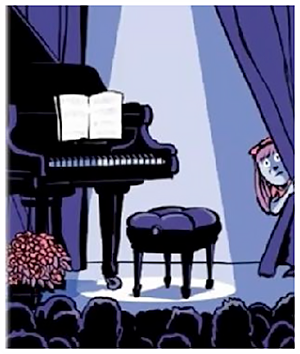 Vanessa observed that performance anxiety was consistently among the top concerns of teachers and was the very top concern of students. A cartoon from The New Yorker showing a performer gazing in terror at the audience from the wings illustrated this point. She would explore her topic in breath rather than in depth. Vanessa asked, “Is your studio a safe place, and are you a safe person for your students to consult?” and “How do they know it is safe?”
Vanessa observed that performance anxiety was consistently among the top concerns of teachers and was the very top concern of students. A cartoon from The New Yorker showing a performer gazing in terror at the audience from the wings illustrated this point. She would explore her topic in breath rather than in depth. Vanessa asked, “Is your studio a safe place, and are you a safe person for your students to consult?” and “How do they know it is safe?”
Performance anxiety, (replacing “stagefright”), is “persisting distressful apprehension and impairment of performance skills (to a degree unwarranted given the aptitude, training and preparation).” Some believe that in time, after many performances, anxiety will lessen. But even the most successful performers have performance anxiety. There are techniques that can help decrease performance anxiety, techniques that must be practiced regularly, well in advance of a given performance, and at a time when the student is calm. None of these techniques compensates for inadequate preparation. Some degree of anxiety is normal, but for some individuals there are underlying issues that might require professional help.
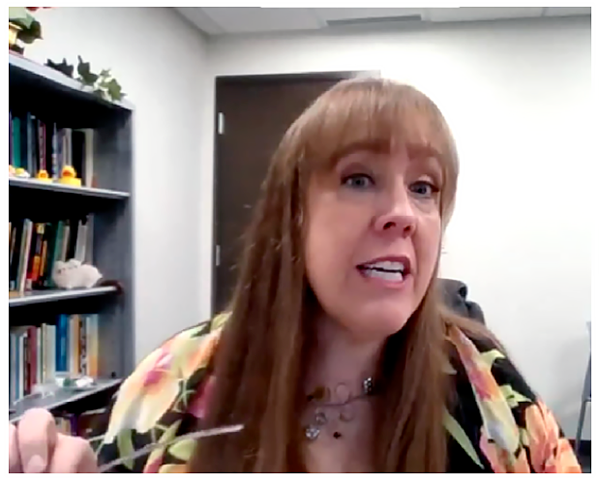
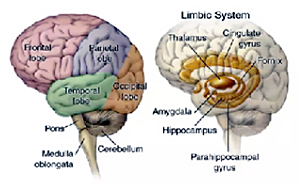 With an illustration of the left and right sides of the brain, Vanessa spoke about the threat- sensing amygdala in the right side triggering a protective response (fight or flight) and about the left or “reasoning” side, which can communicate with the right side with the use of cognitive strategies. The amygdala cannot differentiate the level of danger. The physiological reactions like sweating, cold hands, dry mouth, excess muscle tension, and pounding heart are essentially protective. Professional performers who successfully cope with these physiological responses often do not address the mental symptoms. The fear of failure often leads some people to procrastinate, making resolution of performance anxiety more difficult.
With an illustration of the left and right sides of the brain, Vanessa spoke about the threat- sensing amygdala in the right side triggering a protective response (fight or flight) and about the left or “reasoning” side, which can communicate with the right side with the use of cognitive strategies. The amygdala cannot differentiate the level of danger. The physiological reactions like sweating, cold hands, dry mouth, excess muscle tension, and pounding heart are essentially protective. Professional performers who successfully cope with these physiological responses often do not address the mental symptoms. The fear of failure often leads some people to procrastinate, making resolution of performance anxiety more difficult.
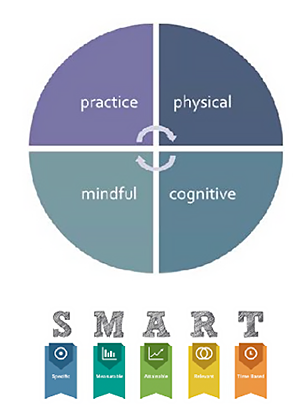 Vanessa displayed four management areas as a pie chart divided into quarters labeled Practice, Physical, Cognitive, and Mindful. From her studies of sports psychology, she learned Practice principles that are applicable to performance anxiety management. Practice is documented so that progress can be measured. The acronym SMART outlines the following criteria for goals of practice: Specific, Measurable, Attainable, Relevant, and Time-based. Frequent practice in overcoming adverse situations is also recommended. How often is a performance glitch forgotten because the performer was able to get back on track with a well-practiced routine!
Vanessa displayed four management areas as a pie chart divided into quarters labeled Practice, Physical, Cognitive, and Mindful. From her studies of sports psychology, she learned Practice principles that are applicable to performance anxiety management. Practice is documented so that progress can be measured. The acronym SMART outlines the following criteria for goals of practice: Specific, Measurable, Attainable, Relevant, and Time-based. Frequent practice in overcoming adverse situations is also recommended. How often is a performance glitch forgotten because the performer was able to get back on track with a well-practiced routine!
Physical techniques to decrease anxiety include diaphragmatic breathing, relaxation exercises (either progressive relaxation moving down the body or tense and release applied to various muscles), and mindful movement like yoga and gentle stretching. Pre-performance routines involving lucky tokens, clothing, or food may quell jitters. Wellness awareness, adequate sleep, nutrition, hydration, and injury- preventive techniques are other aids. Finally, exercise can help to reduce tension, even shortly before a performance, if there is time to slow down.
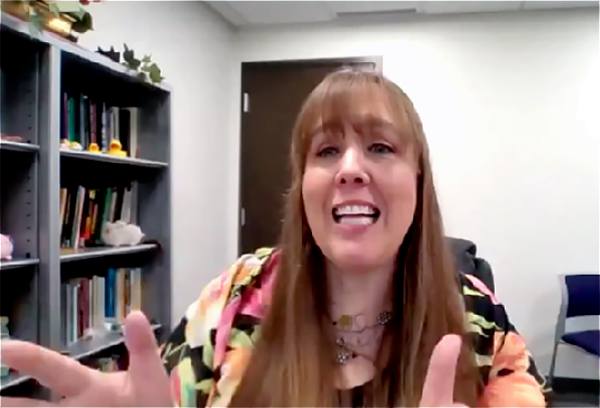
Re Cognition, Vanessa stated that with our ability to think about our own thinking, (metacognition) we have the ability to change our thinking. When an event occurs, thoughts are generated, and these beliefs evoke emotion, which trigger a reaction. To redirect or adjust this series, modify the thought. Vanessa stressed positive thinking after asking us not to think of an object, and we were all drawn into dwelling on the forbidden thought. In coping with performance anxiety, concentrate on constructive, positive goals.
Of Mindful, the final quadrant, Vanessa said, “ Music- making is mindfulness in action.” Being mindful relates to observation, “the deliberate and gentle focus of awareness, without evaluation, on the thoughts and events of the present moment.” She then listed the performer’s attitudes of mindfulness: non-judging, acceptance of audience noise, listen to my sound as I perform, trust in my good preparation, be free from forcing, and be in ‘the zone.’ Vanessa discussed the difference between the practice mindset and the performance mindset: active cognitive processing vs. automatic execution, focus on details vs. big picture, correcting mistakes vs. maintaining continuity and more. She also mentioned rescue techniques related to the senses that may be applied to ease tension. One was a breathing exercise combined with a finger- tracing movement. Creative visualization, that is, the use of imagery, can embolden a performer.
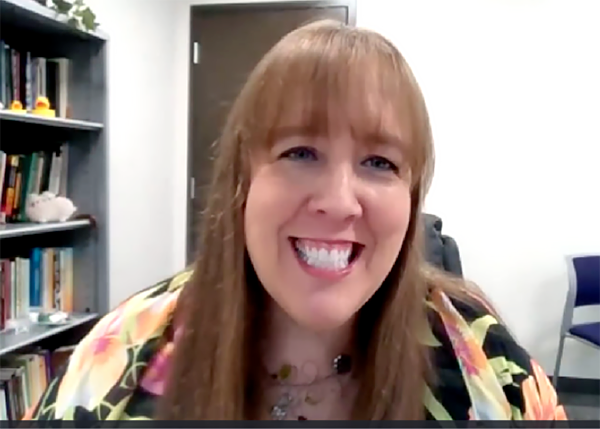
But remember that adrenaline can be our friend. It heightens our awareness and triggers an increase in energy. Some excitement is normal. This was a most fascinating presentation, crammed with content.
Bertha Mandel, writer
Lisa Gonzalez, screen shots and layout
Danette Whelan, Zoom manager